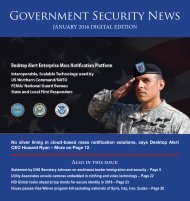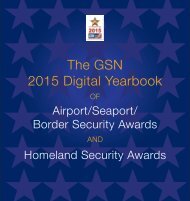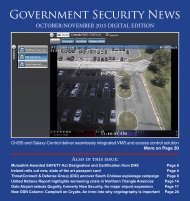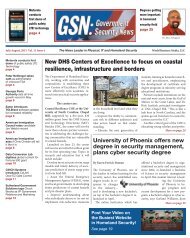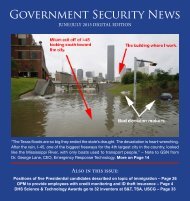The GSN 2015 Digital Yearbook
You also want an ePaper? Increase the reach of your titles
YUMPU automatically turns print PDFs into web optimized ePapers that Google loves.
National Programs and Protection Directorate.<br />
Global spending also parallels the DHS spending raise.<br />
A new market research report, “Global Homeland Security<br />
and Emergency Management Market, 2013–2018”,<br />
published by MarketsandMarkets is expected to reach<br />
$544.02 Billion by 2018. Unfortunately, those numbers<br />
could go even higher if there are more incidents similar to<br />
what happened in Paris, Mali, and San Bernardino, CA.<br />
<strong>GSN</strong>: What area/issue pending trends do you<br />
see as priorities for the homeland security<br />
community?<br />
CB: Counterterrorism and the counter CBRNE (chemical<br />
, biological, Radiological, Nuclear, and Explosive) mission<br />
will always be fundamental to homeland planning and<br />
spending. Those are the most catastrophic threats. In<br />
addition to CBRNE DHS has assumed more and more of a<br />
leadership role in cybersecurity derived from both Presidential<br />
mandates and congressional legislation.<br />
Cybersecurity is indeed a top priority as government agencies<br />
and mega corporations experience more data breaches<br />
with each passing year. I recently published an article<br />
in <strong>The</strong> Federal Times on Key homeland security priorities<br />
to watch in 2016 (http://www.federaltimes.com/story/<br />
government/dhs/blog/<strong>2015</strong>/12/15/key-homeland-securitypriorities-watch-2016/77368604/)<br />
My thoughts in regards<br />
to cybersecurity verbatim:<br />
“<strong>The</strong> <strong>2015</strong> DHS budget directed more than $1.25 billion<br />
to cybersecurity and that trend will continue in 2016.<br />
Cybersecurity and IT have moved to the forefront since<br />
DHS’s inception as we have become a more interconnected<br />
world. New legislation pending in Congress formalizes<br />
the increased DHS role in public/private partnering.<br />
New legislation also would update the 12-year-old Federal<br />
Information Security Management Act (FISMA) and delineate<br />
DHS’s role in guarding government networks and<br />
websites.<br />
A priority for 2016 will be to accelerate rollout of<br />
Einstein III Accelerated (E3A), the latest phase of DHS’s<br />
automated network-security correcting systems. DHS has<br />
established memoranda of agreement with 55 federal<br />
agencies to implement Einstein to provide horizon scanning<br />
and automated monitoring, detection, and remediation<br />
of government networks. DHS is also planning for<br />
new cyber technologies that provide advanced defense of<br />
network framework layers, including authentication, better<br />
encryption, biometrics, and data analytical tools”.<br />
<strong>GSN</strong>: What future areas of homeland security<br />
interest would you advise companies to explore?<br />
CB: <strong>The</strong> key word really is “future” and it is already<br />
around the corner with the Internet of Things (IoT).<br />
Recently both the FBI and DHS issued warnings about IoT<br />
and pending threats. <strong>The</strong> reality is that we have become<br />
immersed in a new digital era comprised of more than 50<br />
billion interfaced devices. Anything connected is vulnerable.<br />
Expect significant investments in smart cities, smart<br />
homes, smart businesses, and smart governments in the<br />
next decade. For the security community this conveys<br />
opportunities in developing and integrating new sensors<br />
for threat detection, surveillance, predictive data analytics,<br />
Continued on next page<br />
9








